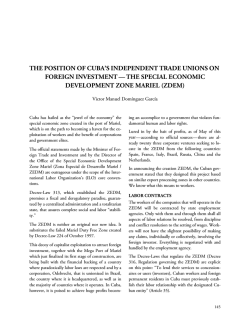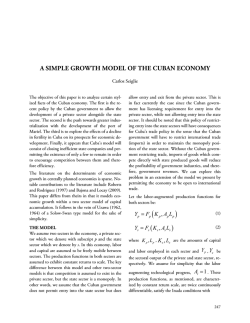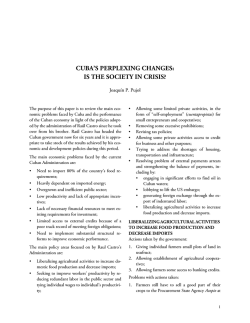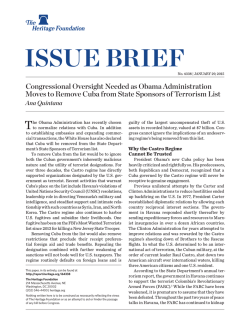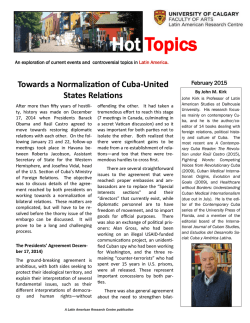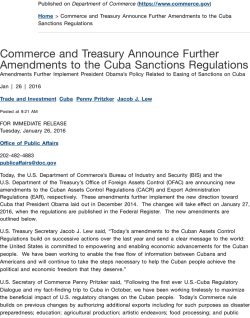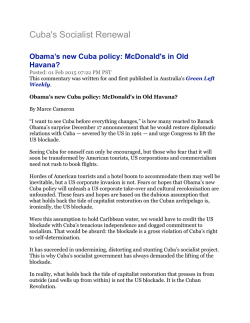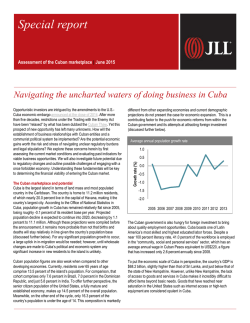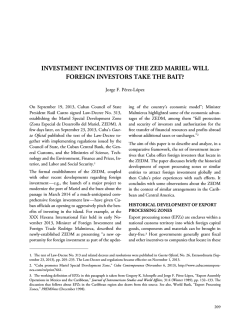
Jorge Perez
WHERE ARE WE? THE STATE OF NEGOTIATION OF A NEW TREATY BETWEEN THE EUROPEAN UNION AND CUBA Martin Palouš On February 10, 2014, the Council of European Union Foreign Ministers agreed to start negotiations about a new bilateral agreement with Cuba and notified the EU External Action Service (EEAS) about this decision. EEAS, which had taken “soundings” with the Cuban side during the latest political dialogue session and received a clear signal from Havana that the Government of Cuba was prepared to engage in the process of negotiation with the EU about a new treaty without any further condition,1 conveyed immediately this information to the Cuban capital and both parties started to work together on the logistics and modalities. tive to establish a roadmap for the upcoming talks and an outline for a future accord. What has been agreed was the basic purpose and structure of the treaty: So far, two rounds of negotiations have taken place between the delegations of EEAS (led by its Managing Director for the Americas, Christian Leffler), and the Cuban government (led by Deputy Foreign Minister Abel Moreno). The first meeting took place in Havana on April 29–30, 2014, with the main objec- On August 27 and 28, the EU and Cuban delegations met for the second time in Brussels and had a first exchange concerning cooperation, economic relations and trade. The third round is being scheduled for the beginning of December in Havana, which should return to the discussion of a future coopera- • • A new treaty should govern the full scope of relations between the EU and Cuba (political dialogue, cooperation, economic relations and trade) in a single agreement. It should be a standard legal instrument, similar to the treaties regulating the relations of the EU with other states of the ACP (African, Caribbean and Pacific) Group (all of which, unlike Cuba, are signatories of the Cotonou Agreement2). 1. Cuban Foreign Minister Bruno Rodríguez confirmed this position in a letter to Catherine Ashton, High Representative of the European Union for Foreign Affairs and Security Policy, and Vice-President of the European Commission (HR/VP), sent to Brussels immediately after their last meeting: “Cuba’s will to negotiate with the EU a new contractual framework to be mutually agreed….When the EU takes the corresponding decision, Cuba will then respond respectfully and constructively.” 2. Cotonou or “the ACP-EC Partnership Agreement” (2000/483/EC) is a comprehensive agreement between the members of the African, Caribbean and Pacific Group of States (an organization of 79 African, Caribbean and Pacific States, including Cuba, created by the Georgetown Agreement in 1975 and having its Secretariat headquarters in Brussels) on the one side, and the European Community (now the EU) and its Member States on the other. It was signed in Cotonou, Benin, on June 23, 2000. Its main objectives are the reduction and eventual eradication of poverty and the gradual integration of African, Caribbean and Pacific States into the global economy, whilst adhering to the aims of sustainable development. It includes a strong political dimension consisting of regular political dialogue, peace-building policies, conflict prevention and resolution and promotion of human rights, democratic principles based on the rule of law and transparent and accountable governance. Its main financial instrument is the European Development Fund. Cuba first announced its intention to sign the Cotonou Agreement by a Verbal Note of February 2, 2000, but later withdrew its petition, arguing that the EU was setting unacceptable conditions for Cuba's accession with the attempt to infringe into Cuba’s “internal affairs.” 32 The State of Negotiation of a New Treaty Between the European Union and Cuba tion agreement between the two parties along with — as Christian Leffler put it in his statement — “more sensitive political questions.” But he added immediately: the issues that will be discussed have not still been agreed upon. THE PRECEDING HISTORY: THE EU MAIN POINTS OF DEPARTURE First of all, let us be clear what it is all about. It is the future of Cuba's totalitarian regime, which keeps in power the same people for more than 55 years. What the EU expects, and what is actually a fundamental condition for the success of the EU’s newest round of talks, is simple: this regime must be changed! What then is the biggest challenge? It is the fact that Cuba’s aging representatives, led by the Castro brothers, still adamantly refuse — in spite of all their declared intentions to reform the socialist system and adapt it to the challenges of the 21st century — to acknowledge and honor, fully and unconditionally, what the European Union considers as a conditio sine qua non for fair and efficient cooperation between developed and developing countries. It is the continuing rejection of the “revolutionary” Cuban leadership to create “a political environment” on the island “guaranteeing peace, security and stability, respect for human rights, democratic principles and the rule of law, and good governance.”3 It is the inability or unwillingness of the Cuban old guard, still firmly holding power, to work with the EU in a similar way as other members of the ACP group do, in order to reach the goal of “gradual integration into the world economy” of its members and to use the various programs of European economic assistance for their long-term “sustainable development.” By the blatant, systematic and continuous violations of human rights and freedoms — articulated in the Universal Declaration of Human Rights, guaranteed by the package of subsequent covenants in the Inter- national Bill of Rights, and also contained, among other, in the conclusions of the 1993 UN Vienna Conference on Human Rights — committed day after day in Cuba, allegedly in defense of a revolution which took place more than 55 years ago, Cuba is in permanent breach of its international obligations erga omnes. The consequence stemming from public international law is clear and simple (see Article 30 of the Draft Articles on Responsibility of States for Internationally Wrongful Acts): all the states and every international organization can take proportionate countermeasures against Cuba and remind its government to stop committing the internationally wrongful acts and to offer appropriate assurance and guarantees that such acts will not be repeated in the future. The rationale behind the freeze of the relationship between the EU and Cuba between 2003 and 2008 was a reaction to Cuba’s “black spring” of 2003, when 75 dissidents and human rights defenders were arrested and sentenced to long term imprisonments. The same attitude was reflected in the Common Position on Cuba adopted on December 2, 1996, by the Council of the European Union (pursuant to Title V, Article J.2 of the Treaty on European Union– Provisions on Common Foreign and Security Policy), also rejected by the Cuban Government as an unacceptable “interference in Cuba’s internal affairs.” According to this unilateral decision of the EU — in effect today and to be superseded only by the entrance into force of a new bilateral treaty which supposedly would even legally strengthen its wording and its spirit — “the objective of the EU in its relations with Cuba is to encourage a process of transition to pluralist democracy and respect for human rights and fundamental freedoms, as well as a sustainable recovery and improvement in the living standards of the Cuban people.”4 It is the EU's “firm wish,” it is stated here unequivocally, “to be Cuba’s partner in the progressive and irreversible opening of the 3. The ACP-EC Partnership Agreement, 2000/483/EC, Preamble. 4. Common Position of 2 December 1996 defined by the Council on the basis of Article J.2 of the Treaty on European Union, on Cuba (96/697/CFSP) 33 Cuba in Transition • ASCE 2014 Cuban economy.”5 The possibility of the EU's “full cooperation with Cuba,” however, “will depend upon the improvements in human rights and political freedom.”6 After Raúl Castro was elected President of Cuba in February of 2008, several positive steps were taken under his leadership that could not have gone unnoticed by the European Union and its Member States. First, Cuba immediately signed two basic international human rights conventions, the International Covenant on Civil and Political Rights and the International Covenant on Economic, Social and Cultural Rights,7 something that his brother Fidel had been adamantly opposed to do. Second, all of the individuals who were arrested and sentenced to long terms in prison in the “black spring” of 2003 were released thanks to the mediating efforts of the Spanish Government and the Holy See (even if the most of them were forced to emigrate from Cuba with their families with no possibility of return). Third, the Cuban Government has decided to start the process of economic reforms and, among other measures, also adopted a new law on travel documents allowing Cubans, including dissidents, to leave freely and return to the country. There is no doubt, that the firm grip of power of the current rulers is still shaping decisively the social and political reality of Cuba. The winds of change, however, started to blow on the island and transform gradually the airless environment of Cuban society, still paralyzed by the totalitarian plague. The EU, observing the process of on-going Cuban transformations — some Europeans being optimistic without reservations, some more sober as far as their basic direction and real impact, some unable to see, up to the present moment, any fundamental change and arguing that totalitarianism in Cuba is going as strong as ever before — has decided to reciprocate. The EU diplomatic measures against Cuba adopted in 2003 were lifted in June of 2008 and political dialogue and development cooperation resumed. A number of Member States have entered into their own bilateral arrangements with Cuba, despite the existing Common Position. Cuba has received from the EU more than 70 million Euros in the past few years through the different programs of assistance and is enjoying in its trade with the EU — at present its second biggest trading partner (with 19% of total trade) — the benefits ensuing from the General System of Preferences. The EU Internal Mandate In 2010, the EU opened an internal debate about the future of EU-Cuba relations, with the leading question being: how can the EU engage most effectively in support of the on-going process of Cuban reforms, to make them irreversible, radical enough and fully compatible with the criteria the EU has set generally for the development cooperation? This debate has arrived at the decision mentioned above to invite Cuba to negotiate about a new bilateral agreement. The fundamentals of the “EU Negotiation Directives for a Bilateral Political Dialogue and Co-operation Agreement with Cuba,” were discussed among the EU Member States for two-and-one-half years and agreed in February of 2014. Thus, a new bilateral agreement with Cuba should govern the full scope of relations between the EU and Cuba — political dia- 5. Ibid. 6. Ibid. 7. It must be noted that Cuba made the following interpretative declaration in this occasion: “The Republic of Cuba hereby declares that it was the Revolution that enabled its people to enjoy the rights set out in the International Covenant on Civil and Political Rights. The economic, commercial and financial embargo imposed by the United States and its policy of hostility and aggression against Cuba constitute the most serious obstacle to the Cuban people’s enjoyment of the rights set out in the Covenant. The rights protected under this Covenant are enshrined in the Constitution of the Republic and in national legislation. The State’s policies and programs guarantee the effective exercise and protection of these rights for all Cubans. With respect to the scope and implementation of some of this international instrument, Cuba will make such reservations or interpretative declarations as it may deem appropriate.” This statement, however, is just an announcement of policy pursued and should not be confused with reservations, declarations and understandings the State parties make at the moment of ratification of international agreements. No matter how authoritative its wording sounds, it cannot have any real effect as far as the content or scope of rights enshrined or as far as obligations between the State Parties concerned! 34 The State of Negotiation of a New Treaty Between the European Union and Cuba logue, cooperation, economic relation and trade — with the following purpose: center; emphasis on the will to cooperate in international issues of mutual interest. 1. Consolidate existing relations and develop their potential and mutual benefits by providing a comprehensive and forward-looking perspective for the EU-Cuba relationship; 3. The agreement should aim to raise the role and profile of both parties in each other’s regions and to promote understanding by encouraging cooperation of academics, think-tanks and media including through civil society. 2. Develop a dialogue based on the respect for and promotion of human rights, democracy and good governance, and on defending common values on the world stage, in particular through the United Nations; 3. Promote cooperation to contribute to achieving the Millennium Development Goals and the post-2015 framework, support the reform process in Cuba, foster exchanges in areas of interest, promote sustainable development, economic growth, full and productive employment, decent work for all, poverty reduction, and the improvements of standards of living; 4. Promote regional cooperation in the Caribbean to develop, where appropriate, regional responses to regional and global challenges; 5. Promote trade and economic relations, confirming the importance which both sides attach to the principles and rules governing international trade, in particular under the auspices of the WTO, and the need to apply such rules in a transparent and non-discriminatory manner. The general principles that will serve as a basis for future EU-Cuba relations are: 1. Respect for and promotion of democratic principles, human rights and fundamental freedoms as set out in the Universal Declaration of Human Rights and in the core international human rights instruments and their optional protocols, and for the rule of law; this should constitute an essential element of the Agreement which will also provide for the possibility of unilateral suspension in the event of infringement of these principles. 2. Expression of the commitment to a strong and effective multilateral system, based on international law, supported by strong international institutions and with the United Nations at its Towards Normalization of the EU-Cuba Relationships The common point of departure of the EU and Cuba in their new mutual engagement seems to be contained in the word “normalization.” Both the EU and Cuba have confirmed repeatedly their desire to finally normalize their relationships and to reach a mutually acceptable agreement concerning their future development, but each of them apparently still having a different understanding and expectations what this might mean and imply. For the EU, the “normalization” of this relationship requires Cuba to finally start behaving like a “normal” ACP country; to get rid of its worn out revolutionary ideology, long-time overdue; to open up its political and economic system and set itself on the way of national reconciliation: democracy, the rule of law, respect for human rights and economic prosperity. “Normalization” of this relationships implies first of all that all general guidelines and strategic plans the EU has discussed internally and adopted for various spheres of international cooperation (such as the “Strategic Framework and Action Plan on Human Rights and Democracy,” adopted on 25 June 2012, for instance) are fully applicable and used in the EUCuba relationship; that second, that the Cuban revolutionary “exceptionalism” is not to be tolerated any more. Having decided to engage Cuba, the EU is not at all turning away from its core principles and adopting a more pragmatic approach, but the other way around. As High Representative for Foreign Affairs and Security Policy and European Commission Vice President Catherine Ashton stated at the moment when the decision to start the process of EU-Cuba negotiations was reached by the Committee of Foreign Ministers: “it is still human rights,” she said, “what is to remain at the core of the relationship” between the 35 Cuba in Transition • ASCE 2014 EU and Cuba. The decision just taken should not be understood as “a policy change from the past”! The Common Position from 1996 is still in force! Therefore, the only concession made here is that the EU has agreed to start with this process under the existing circumstances, despite the fact that the current state of human rights in Cuba is, for sure, far from satisfactory or even acceptable. The Cuban Government perceives the normalization of the relationship between the EU and Cuba through its traditional ideological lens and gives it an entirely different meaning. Departing from the sacrosanct principle of “non-intervention into domestic affairs of sovereign states,” it sticks to the claim of having free hand to handle the process of Cuban transition in its own way — of course, to implement all necessary economic reforms without greater shocks or upheavals and even to “liberalize” the political environment a little bit and with great caution, but above all, to keep in power all those who have been ruling in Cuba for decades and are responsible for the current, highly unsatisfactory state of affairs on the island and replace them gradually by their heirs being recruited now among the loyal and “politically conscious” members of younger generations. But on the Cuban side, there has been a positive signal sent to the EU that should not be overlooked. If in the past the Cuban Government conditioned any future engagement with the EU on the strict demand of lifting of the 1996 Common Position, it now has agreed to start this process with the Common Position in force and thus preliminarily has accepted a reality that, for the EU, human rights “remain at the core of the relationship”; that respect for such rights is a conditio sine qua non for any progress to be made; that this question will not be swept away from the table and will not go away, both now during the negotiation process and in the future, when the agreement on the wording of a new treaty between the parties is reached and this treaty comes in force after the process of its ratification is ended. To summarize once more what is at stake between the EU and Cuba, and what are the main questions pertinent in a upcoming round of mutual involvement: 36 • Both parties have made a decision to engage, but there is significant disagreement between them as far as the interpretation of principles to be applied or the practical “rules” enabling such engagement. How far is the Cuban Government allowed to go in its daily “routines,” which are in open and explicit violation of internationallyrecognized and legally valid human rights norms? Where exactly are the EU redlines here? How tough should the EU negotiation strategy be, taking seriously into consideration the possibility of unilateral suspension of talks in the event of serious infringement of the EU principles? • A new bilateral treaty should govern the full scope of relations between the EU and Cuba, i.e., a political dialogue primarily about human rights should be put together with all sorts of cooperation agreements in one single legal document. The negotiation should obviously take place in a transparent manner and “in good faith.” At the same time, however, it is evident that with regard to the current EU-Cuba relationships, it will not be an easy ride. It must be clear from the very beginning that it is not a process taking place between two essentially likeminded partners, but a tough bargain to be made between democrats and totalitarians. • What bargaining chips should be used by the EU negotiators, if they are to follow the instructions given to them in their mandate? Is really EU economic assistance an incentive strong enough to compel the Cuban negotiators to yield in the area of human rights? Can the EU team rely on a classical combination of “sticks and carrots,” where each quid is strictly tied to its pro quo? Is the EU really united here or not? Do the existing economic relationships between the EU Member-States and Cuba represent a detriment or an asset for the overall success of these efforts? Can some “confidence building measures” enabling the achievement of the desired goal — a new treaty fulfilling the purpose and in conformity with the principles agreed by the EU Member States — be suggested to facilitate the process of its negotiation? The State of Negotiation of a New Treaty Between the European Union and Cuba • How much time should be allowed for this process? Are we talking about months or years? Should it be brought quickly to some conclusion or let open-ended or even turned into a long or at least medium-term factor affecting the on-going process of Cuban transition? THE PERSPECTIVE OF THE CUBAN DEMOCRATIC OPPOSITION: WHAT CAN AND SHOULD BE DONE IN THE CURRENT SITUATION? Many free-minded Cubans, both on the island and abroad, raised serious concerns when the EU announced its decision to engage Cuba in this negotiation. Was it a regrettable act on the part of the EU, going back on its own principles articulated in the Common Position and legitimizing a totalitarian regime which does not and will never respect them? Through this action was the EU in fact betraying all Cuban democrats and human rights defenders who find themselves in an open confrontation with the Cuban totalitarian government? Is the EU's aim in this deal some sort of dirty compromise with the current Cuban rulers in exchange for some dubious economic benefits and maybe better protection of foreign investments? These questions have not faded away with the start of the negotiations and seem to be even more relevant now after observing what has happened so far in Havana and Brussels during the first two rounds of the EU-Cuba talks. Assessing their atmosphere, course and interim results, one can ask again: Where is the EU intention to make human rights an “essential element” of a new agreement? Does Professor Gratius, whose article has been recently put on the official webpages of the European External Action Service (EEAS),8 get it right when arguing that one of the reasons for “optimism” that the process of engagement will run smoothly forward this time, is that “the EU policy toward Cuba is no longer shaped by its member states” — some of which opposed adamantly the decision to invite Cuba to the negotiation table now, pointing to its current, entirely unacceptable record in the area of human rights and pushed through at least the concept of the EU’s redlines? Does this undoubtedly scandalous opinion correspond to the official EEAS position? And looking at the existing course of the negotiations with the Cuban delegation and the results so far achieved, is it a right thing to start with the “carrots” of commerce and investments and push “sticks,” i.e., a “more politically sensitive” human rights agenda to the later stages of the talks? Is it acceptable for the EU to accept the separation of human rights to be discussed in the framework of “political dialogue” from the agenda of “cooperation agreements”? There is no doubt that with all these questions in mind, the EEAS negotiation team led by Christian Leffler has a clear mandate to act in this matter on behalf of the European Union and that only the final result of the negotiation process should be judged and measured against the internal directives approved by the EU Member States. It certainly still remains to be seen what kind of progress will be reported after the third round of negotiations, when “more sensitive political questions” are to be put on the table. One question, however, cannot be postponed and has to be raised right now: what is the place of Cuban civil society in this process? Isn’t it essential to find it, if human rights are to constitute really an “essential element” of a new agreement? Have the EU negotiators an intention at all to bring into the overall process of the EU-Cuba rapprochement the independent voices from civil society and factor their opinions into the process? Is the Cuban Government ready to continue to say no to such EU proposition and stick adamantly to its worn-out ideological rhetoric and the status quo in this matter? Or, is it ready to yield, maybe gradually, step-by-step, and finally recognize that in addition to official negotiators, there is an important and legitimate third party here — the civil society activists and human rights defenders — that have a role to play if progress is to be made and all the “essential ele- 8. http://www.iss.europa.eu/uploads/media/Alert_13_Engaging_Cuba.pdf 37 Cuba in Transition • ASCE 2014 ments,” human rights first among all, are to be given their right place in a future agreement? In these questions lie, in my view, the crux of the matter to be taken seriously by all parties! 1. For the EU and Cuban negotiators, a meaningful and productive participation of civil society is without any doubt a critical test of sincerity of their intentions. 2. For the Cuban democrats and human right defenders it is chance to advance their cause which must not been forfeited but effectively used! Those who came to the conclusion at the moment when the EU announced its intention to engage Cuba that by this very act the EU had proven to be irrelevant from the point of view of their own struggle for freedom and democracy — arguing that their central “theater of operation” is at home, and that their first priority when it comes to the communication of their message abroad is a multifaceted and, of course, historically heavily charged relationship between Cuba and the United States — are simply wrong. The EU-Cuba engagement offers a tremendous opportunity for them and calls for a comprehensive strategy on their side, testing their ability to act in concert despite all of their differences and reminding them the basic and simple truth intrinsically connected with the very nature of totalitarianism: to resist it effectively requires not only strength and resilience on the home turf, but also a powerful enough, action-oriented and informed international projection. This argument turns attention to one of the key concessions the current Cuban regime made in its own transition plans, whatever their intended outcome may be, a concession which must be used, as long as it lasts, with the maximum of energy and creativity in joint efforts of all Cuban democrats and human rights defenders: the liberalization of travel abroad, allowing Cuban citizens to participate personally — individually or collectively — in international events and influence the international opinion. In 2013 and 2014, as a result of the new policies of the Cuban government, tens, maybe hundreds of Cuban dissidents had an opportunity to travel abroad. They gave lectures, spoke in all sorts of polit- 38 ical forums, and received various human rights prizes previously awarded to them; they were received at foreign ministries, participated in various conferences or training programs; they started to have regular reunions with their friends and international partners from the NGO world in order to exchange views; they discussed traditional and innovative forms of assistance to Cuban civil society, planned future common activities, tried to understand better what is going on in the world outside their island still ruled by the Castro brothers that finds itself, in spite of the international adventures of the Castro brothers’ regime in — certainly not “splendid” — isolation. Miami, home of the largest Cuban community in exile, has become a place of many unprecedented encounters in the past two years. Conferences have been hosted with Cuban participants coming from both sides of the Florida Straits. Book presentations and seminars are now routinely organized in Miami bringing together people who have lived separately for many decades. The mobility within the Cuban nation, divided as a result of the Revolution, has increased tremendously. The communications between Cubans inside and outside the island, multiplied dramatically. One essential component in a comprehensive strategy aimed at freeing Cuba from the totalitarian legacy seems to be still underestimated and certainly rather underdeveloped. It is the ability to attract enough attention from international society to influence decisively policies of Cuba’s key international partners including the EU; to raise the expectations in the free world that the island, still infested by a totalitarian plague, has the strong potential to become a so badly needed positive example of successful transition from dictatorship to democracy. It is easy, of course, to challenge this proposition and I can imagine many people will be ready to do it. But we should remind ourselves that Goethe once wrote: “All theory is gray, my friend. But forever green is the tree of life.” The gist of the argument presented in this analysis is as follows: The EU-Cuba negotiation about a new bilateral treaty can serve, if civil society is empowered and legitimized and given its appropri- The State of Negotiation of a New Treaty Between the European Union and Cuba ate place in it, as its critical test, a reality check, as a key tool for its verification. CONCLUSION To summarize, once more, what is being proposed: 1. To integrate, if possible, all the group, currents, initiatives existing within the community of Cuban democrats, human rights defenders, civil society activists, bloggers, free media, independent intellectuals, so that they are able to step together and in one voice into the process of the EUCuba negotiations; 2. To open channels of communication not only with the EU institutions in charge of the negotiations, but also with the European Parliament and the EU Member States and raise with them the demand of free-minded Cubans that inde- pendent civil society must somehow participate in the process of the EU-Cuba rapprochement, if human rights, indeed, constitute an “essential element” of a new treaty; to claim their right to participate in the public debate about it as an important topic which can have a significant influence on their lives as well as on the lives of Cuban future generations; and 3. To signal flexibility as far as form of participation and readiness to bring their inputs and contributions to the process taking place among politicians and diplomats, proving by this very fact that Cuba can, indeed, become a normal country, as the EU hopes; that it is able and willing to open up its political system and finally start to comply with the universally recognized values and principles. 39
© Copyright 2026
